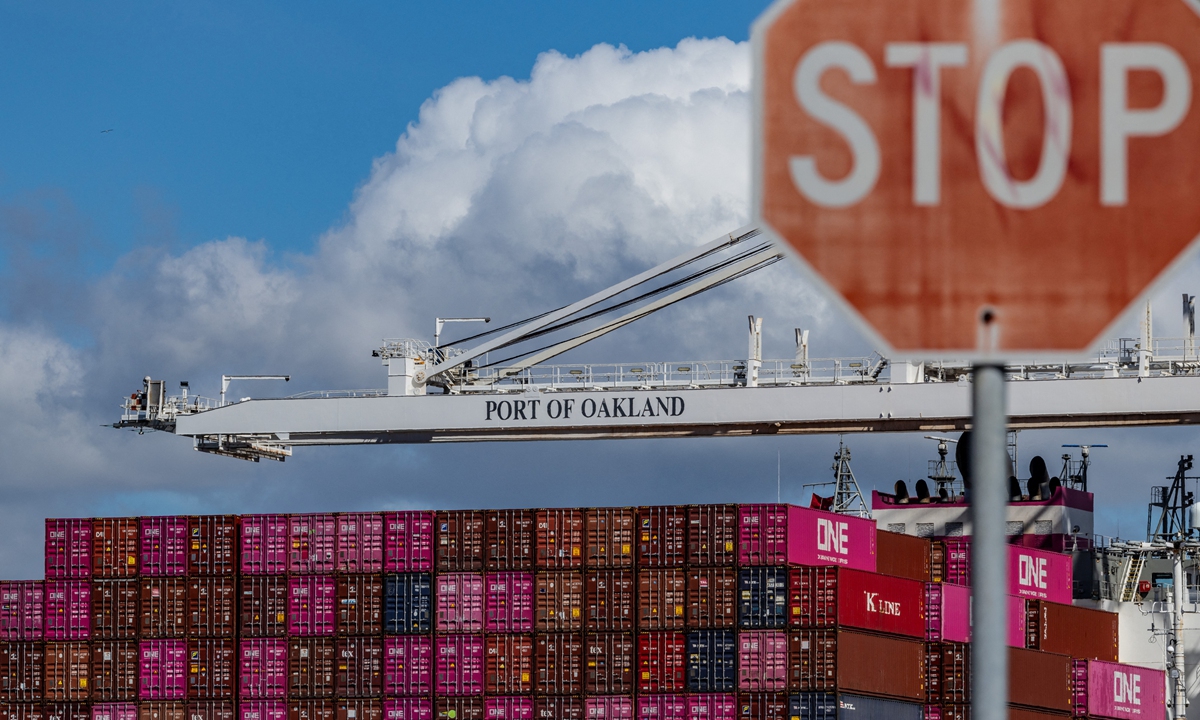
A cargo ship full of shipping containers is seen at the port of Oakland as trade tensions escalate over US tariffs, in Oakland, California, the US, on March 6, 2025. Photo: IC
The reported US plan to announce so-called reciprocal tariffs later this week has prompted criticism from its trading partners. Some economists have also reportedly warned of potentially huge economic costs. A Chinese expert said on Tuesday that the US' protectionist policy could seriously undermine the global free trade system.
The US administration will announce the tariff move during a White House event on Wednesday, US time, Bloomberg reported on Tuesday, citing White House Press Secretary Karoline Leavitt. Leavitt declined to offer details about the rate of the reciprocal tariffs and which countries would be hit, according to the Bloomberg report.
On Monday, the US administration released an encyclopedic list of foreign countries' policies and regulations it claimed as trade barriers, two days before the US administration proposed imposing reciprocal tariffs on trading partners, according to Reuters.
"The so-called trade barriers report released by the US is nothing but a blatant tool for the US administration to justify its proposed reciprocal tariffs. This report is judged solely from the US perspective and by US standards, bearing no resemblance to objective reality. It is clearly rooted in protectionism," Li Yong, a senior research fellow at the China Association of International Trade, told the Global Times on Tuesday.
By releasing this report, the US is using it as a pretext for implementing tariff policies, including the upcoming reciprocal tariffs. This is a classic move of using false pretexts to push through protectionist policies that only serve the self-interests of the US, which will seriously undermine the global free trade system and environment, Li added.
The reported US plan has drawn criticisms from its trading partners, with some vowing to take retaliatory actions against the US if the latter imposes the tariffs.
"Europe has not started this confrontation. We do not necessarily want to retaliate, but we have a strong plan to retaliate if necessary. Our objective is a negotiated solution. But of course, if need be, we will protect our interests, our people, and our companies," Ursula von der Leyen, European Commission president, said in a speech on Tuesday, according to The Guardian.
The Guardian also reported on Tuesday that a full-scale trade conflict between the US and its trading partners could result in a $1.4 trillion global welfare loss, citing a report from economists at Aston Business School.
In addition to the EU, some US trading partners are also reportedly mulling responses to the US tariffs.
South Korea will closely analyze the US' report to devise response measures, while continuing its tariff negotiations with the US, its industry ministry said, according to the Yonhap News Agency.
In Australia, the federal government also toughened its language against the US administration, after the US' report had set its sights on Australia's pharmaceutical sector, biosecurity protections and laws requiring social media giants to pay for news. Australian Prime Minister Anthony Albanese has vowed none will be touched "on my watch," the Australian Broadcasting Corp reported.
Chinese officials have also repeatedly criticized various US tariff measures. "Trade and tariff wars have no winners. No country in the world thrives and prospers through imposing tariffs," Guo Jiakun, a spokesperson for the Chinese Foreign Ministry, said on Thursday in response to a question about the US' 25 percent tariffs on all cars made outside of the country. "The US levies violate WTO rules, undermine the rules-based multilateral trading system, and hurt the common interests of people from all countries."
The US' report on Monday claimed that China "offers substantial government guidance, resources and regulatory support to Chinese companies while actively seeking to limit access to the Chinese market for imported goods, foreign manufacturers, and foreign services suppliers."
The US' accusations on China are extremely feeble and cliched, He Weiwen, a senior fellow at the Center for China and Globalization, told the Global Times on Tuesday.
Industrial subsidy policies are widely adopted by countries around the world. China's industrial subsidy policies are in line with WTO rules, and there are no prohibited subsidies as defined by the WTO. The US, on the other hand, is a major user of industrial subsidies. Moreover, its "America First" policy has severely undermined global trade norms, He said.
Previously, in response to the US' so-called reciprocal tariffs, a spokesperson for China's Ministry of Commerce told a press conference on February 20 that "this is a typical unilateralist and protectionist action that violates WTO rules, in disregard of the negotiated balance of interests under the multilateral trading system over the past 80 years and the fact that the US has long benefited from international trade."




